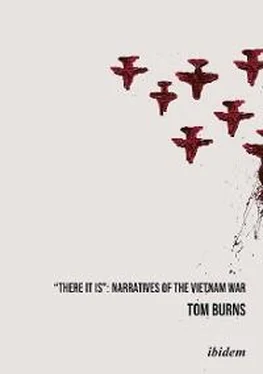In this mood, she picks up a melancholy French paratrooper, Lieutenant Kervallé, who had escaped from the disaster at Dien Bien Phu, where all his friends died—and where, he tells Jerome, “I died with them” (39). Kieu convinces herself that she is in love with this morose, hulking young officer, even though he is indifferent to her beauty, regarding her merely as a half-caste whore. None of the other men can understand why Kieu has chosen this “big lout” of a lieutenant, and Ma Lien more pragmatically warns her that he will not be able to keep her on his pay, that older men of superior rank are more her style. Jerome explains her choice of the lieutenant by his romantic melancholy in the face of loss and defeat. As he tells Julien, Kervallé “wears the tortured expression of our misfortune” (112). Kervallé abandons her, as does “her general,” who had so doted on her earlier when he even dared to take her to an official reception. He is told that such an act was inappropriate for a man of his rank, and he also realizes that he could not take Kieu back to France, where he has a wife (in a revealing passage, the general is shown walking with his wife at Versailles, noting that the Americans now have to contribute to its upkeep, a metaphor for the American aid to maintain France fighting in the colonial war). Ever resourceful, Kieu settles on Rovignon, one of the journalists from a poor suburb in Paris, who needs “an apartment that is not in a slum district” and “a woman who’s beautiful, elegant and expensive and dazzles everyone with her glamour” (179). They go to South Vietnam together.
Kervallé represents the French officer-class after Dien Bien Phu. As a professional soldier, he is a man who prefers the fraternity of the barracks to family life, and he sets out for another colonial war in Algeria or Morocco, even knowing that it too will be “lost” in Paris by the generals and politicians—by a France, he thinks, that is no longer concerned with greatness but soft and content with middle-class comfort and mediocrity. These thoughts on the loss of French greatness through an unwillingness to make sacrifices are shared by his commander-in-chief, General de Langles, who, as he leaves Hanoi, ponders the “dotage of a great nation” (137), echoing the historical remarks of the arch-conservative Admiral Thierry d’ Argenlieu about “fighting for the reestablishment of French greatness.” French High Commissioner after the war, Argenlieu had urged his compatriots to throw over the agreement of 1946 that established peaceful co-existence. 73
The author evidently shares these sentiments. Even the civilian Rovignon joins in a patriotic tirade directed at his American and British colleagues. “We had such a nostalgic memory of being a great nation” (141). As if the reaction of these French characters to the loss of Vietnam prefigures the American loss twenty years later, an American journalist’s reply to Rovignon becomes prophetic: “We’ll reinforce South Vietnam and, since you’ve gone bankrupt, we’ll take your place” (141). The author seems to be nostalgic about the good old days in Indochina, brooding on the decadence of the end of an era but also fondly recalling the cultural interrelationships of colonial rule, while significantly omitting any mention of its long history of social and economic exploitation of the native population. The nostalgia may explain why the author is less than enthusiastic about the Viet Minh, who are to replace his compatriots in North Vietnam.
The two most important Communist characters are shown as intelligent and sophisticated but also, in their private conversations, ruthless and calculating. The problems that they confront in the formation of a new nation are enormous: masses of people unused to discipline, a shortage of rice, a distrusted currency. For the time being, the two leaders decide to blame the French: “I don’t like exploiting hatred,” one of them confesses, “but sometimes it’s necessary, like herbs in rice” (148). Colonel Phang, who will be promoted to general when he enters Hanoi in triumph at the head the Viet Minh 308th Division, is handsome, cultured, and possesses a winning smile. He has risen in the People’s Army through his political skills and ruthlessness, but he is haunted by his past life as Ké, the nephew of the procuress Ma Lien. In his youth, he went as a seminarian to Paris, where he soon abandoned his religious studies to join the budding Vietnamese anti-colonial nationalist movement. There, he printed leaflets, distributed clandestine newspapers, and befriended both Jerome and the leader of another political group working along similar lines—the Indochinese Nationalist Front—the man called Nguyen-Ai-Quoc, who would later be known as Ho Chi Minh.
Puzzled by Jerome’s friendship with so many revolutionaries sworn to evict the French from Vietnam, Ké is told by Ho that Jerome “represents a certain French tradition of friendship and therefore fellow-feeling for all those who revolt against an established order, even if this order has been established by his country” (56). Jerome even supported Ké (Phang) economically for a while in the Paris days, but Phang, now an important man in the Party, is concerned, Jerome thinks, “to wipe out his past completely, maybe because it was still alive within him” (67). While Phang still respects Jerome personally, he distrusts journalists generally because “their freedom of speech and behavior could only jeopardize the delicate balance of military or political hierarchies” (61). The novel is consistently critical of the Communists, not as in Bosse’s novel, because of their failure to live up to the ideals of the leaders, but for the ideological rigidity of the leaders themselves. While listening to his old friend speak, for example, Jerome “wondered why the word ‘people’ suddenly sounded hollow. Ké was not fond of the people. What about Nguyen? In his eyes, the people had to be transformed into ciphers who allowed themselves to be added or subtracted from without anyone offering any resistance” (66).
The Nguyen referred to here is not Ho Chi Minh (who does not figure as a character in the novel) but Phang’s colleague in the Party, the head of Viet Minh security. Nguyen is described by Jerome as being “like the Beria of the regime” (129), a reference to Stalin’s notorious executioner. Jerome argues with Nguyen about the new man that the Communists are trying to construct, the “Vietminh man,” whom Jerome sees as too rigid a type. Nguyen replies, quite plausibly, that revolutionary discipline is essential for success in establishing a coherent society. The Viet Minh, he explains, were once a “hotchpotch” of diverse elements—orthodox Marxists, partisans, Catholics—which had to be united. People were “fused together by eight years of communal existence in the jungle, cut off from their families and social backgrounds” (69). In another sense, this exchange is a rehearsal of the old argument between Communism and its liberal critics, in which western intellectuals were critical of the intolerance and doctrinaire propaganda of Communist regimes, and the Communist leaders believed that the people in whose name they are carrying out revolution, need only to “work and obey” for the time being. In their view, there will be more tolerance later, once the regime has been consolidated and a Communist state is achieved.
According to a French captain captured at Dien Bien Phu, the Communist Viet Minh were victorious because they created a new kind of army, “a total army, in which every soldier is at one and the same time a propagandist, a schoolmaster and a policeman, every officer an administrator, a priest and an agronomist” (62). Whether meant as critique or admiration by a defeated soldier, the statement suggests the attraction of Communism for poor Asian countries, as well as why revolutionary forces like the Viet Minh and later the National Liberation Front were able to achieve victory over powerful adversaries. These revolutionary armies did not consist of military professionals but soldiers who belonged to a highly integrated political, social and military organization.
Читать дальше












